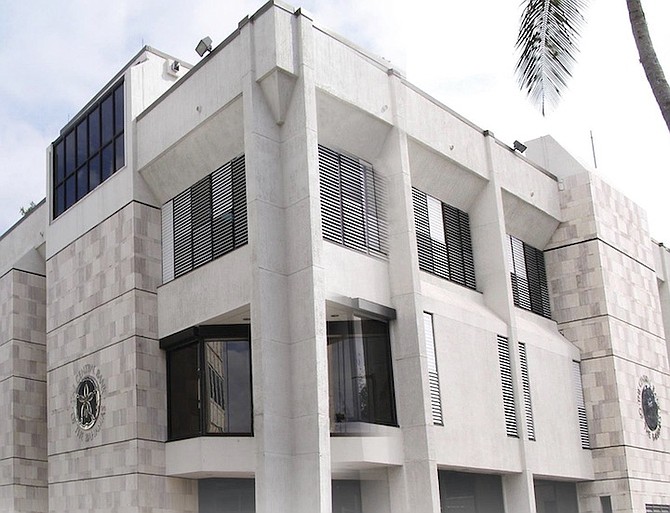By NEIL HARTNELL
Tribune Business Editor
nhartnell@tribunemedia.net
The national debt's growth rate slowed below 1 percent during the three months to end-March 2023 as the total sums owed by The Bahamas to its creditors rose to just under $11.5bn.
The Central Bank, unveiling its latest quarterly review, said that while the national debt's rate of expansion had reduced compared to 2022 it had still risen by some $565.2m on a 12-month annual basis.
"Budgetary financing during the third quarter of fiscal year 2022-2023, was dominated by domestic market operations. In particular, internal borrowings totalled $611.3m, and comprised of loans and advances ($450m), government bonds ($128.8m) and net Treasury bills/notes ($32.4m)," the Central Bank said of the three months to end-March 2023.
"Further, external drawdowns amounted to $117.1m, reflecting expanded use of an existing commercial loan. Debt repayments for the period totalled $673.8m, of which a dominant 80.9 percent went towards retiring Bahamian dollar obligations. As a result of these developments, the direct charge on the Government rose by $67.9m (0.6 percent) over the quarter and by $571.9m (5.4 percent) on an annual basis to $11.104bn at end-March 2023.
"An analysis by component showed that Bahamian dollar debt represented 53.4 percent of the total, while foreign currency liabilities accounted for the remaining 46.6 percent." As for the Government's contingent liabilities, which represent borrowings it has guaranteed on behalf of state-owned enterprises (SOEs), the Central Bank said these "edged up by $0.4m (0.1 percent) over the previous three-month period, but declined by $6.8m (1.7 percent) year-on-year, to $390.6m".
It added: "As a result, the national debt - inclusive of contingent liabilities - expanded by $68.3m (0.6 percent) over the quarter, and by $565.2m (5.2 percent) on an annual basis, to $11.495bn. With the recovery in output, the direct charge as a ratio to GDP decreased by an estimated 3.6 percentage points on a yearly basis to 83.4 percent at end-March. In addition, the national debt-to-GDP declined to an estimated 86.3 percent compared to 90.2 percent in the same quarter of 2022."
Turning to the banking sector, the Central Bank said: "Total domestic credit contracted by $54.7m (0.6 percent) during the first quarter of 2023, notably lower than the year earlier $288.6m (3.2 percent) reduction. This followed an average quarterly decrease of 1 percent over the preceding five-year period.
"In particular, the dominant Bahamian dollar component - comprising 93.5 percent of the total - fell by $26.1m (0.3 percent), significantly lower than the $261.1m (3 percent) decline in the comparable period of 2022. The foreign currency component reduced by $28.6m (4.6 percent), in line with the $27.5m (8.6 percent) fall-off in the preceding year."
Breaking this down, the regulator added: "A detailed breakdown of Bahamian dollar consumer credit showed that net repayments occurred for debt consolidation ($7.6m), land purchases ($2.8m), travel ($1.6 m) and education ($1m), with a more muted repayment of less than $1m recorded for taxis and rented cars.
"In contrast, net lending increased for private cars ($7.3m) and 'miscellaneous' purposes ($6.7m), while smaller gains were posted for furnishings and domestic appliances ($0.9m), credit cards ($0.5m), medical services ($0.4m) and home improvements and commercial vehicles ($0.1m each).
"The remaining private sector loan categories revealed that credit balances decreased for professional and ‘other’ services ($13.2m), construction ($7.9m), transport ($6.3m), fisheries ($2.7m) and tourism ($0.8m). Much lesser credit balances were recorded for entertainment and catering ($0.2m) and mining and quarrying ($0.1m). Conversely, credit balances rose for private financial institutions ($29.3m), manufacturing ($4.1m), 'miscellaneous' purposes ($2.2m) and distribution ($1.8m)."
As for the housing sector, the Central Bank said: "The most recent data obtained from domestic banks, insurance companies and the Bahamas Mortgage Corporation indicated that the total value of mortgages outstanding contracted by $18.8m (0.7 percent) to $2,891bn in the first quarter, extending the $5.9m (0.2 percent) decrease in the corresponding period of 2022.
"Underlying this outturn, the residential component - which comprised 93.1 percent of total mortgages - reduced by $10.1m (0.4 percent) to $2.69bn, exceeding the $1m fall-off in the preceding year. Likewise, the commercial component declined by $8.6m (4.2 percent) to $200.6m, surpassing the $4.9m (3 percent) retrenchment during the same period last year. At end-March, the majority of mortgages were held by domestic banks (86.7 percent) followed by the Bahamas Mortgage Corporation (6.8 percent) and insurance companies (6.5 percent)."





Comments
Use the comment form below to begin a discussion about this content.
Commenting has been disabled for this item.